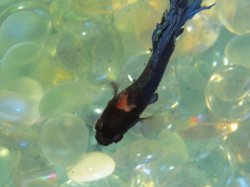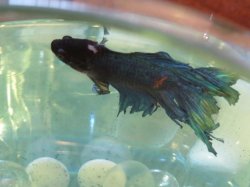I've had Finley now for just over a year; he's my first betta. He's been in a 1.5 gallon bowl, which I know isn't the greatest, and I was probably not watching the water quality closely enough. In any case, last spring he started showing some fuzziness around his fins and stopped eating. On the advice of the local aquarium guy, I dosed him with Pimafix for a week, after which he regained his appetite and seemed to be okay for a while. Since then I have been more careful about water changes, but he didn't seem to be completely well and rather than medicate him again, I added salt to his water (1 tsp per gal).
He's had times of poor appetite, but didn't seem to really be getting worse until about 6 weeks ago when he developed a small (size of a pin head) wound on his back, just below his head. It changed color and became sore looking and then began to get larger. On the basis of online research, I thought he might have columnaris. I put a medicated wonder shell in his bowl, and gave him medicated 20 minute baths (methylene blue, kanaplax and furan-2) for 10 days. He had stopped eating by the time I began this treatment, though still remained somewhat active. Honestly, I think all that pulling him out of his bowl for the treatments was pretty stressful, and of course, he began avoiding me. When the treatments were done, I cleaned his bowl and he's been in unmedicated water (plus 2 tsp salt per gallon). During the treatments his wound (looked like the classic saddleback of columnaris, but became deeper) grew dramatically, and another opened up on his side (see photos). Afterwards, they began closing up but not completely, and it's hard to say if the infection is gone. He was initially just very still, though I could tell he was still alive. It's been a week now, and Finley has just become a little more active and has begun to start eating again.
I'm amazed he's pulled through, but would appreciate any comments or advice regarding care while he recuperates, and if and when I should resume treatment.
Thanks.

He's had times of poor appetite, but didn't seem to really be getting worse until about 6 weeks ago when he developed a small (size of a pin head) wound on his back, just below his head. It changed color and became sore looking and then began to get larger. On the basis of online research, I thought he might have columnaris. I put a medicated wonder shell in his bowl, and gave him medicated 20 minute baths (methylene blue, kanaplax and furan-2) for 10 days. He had stopped eating by the time I began this treatment, though still remained somewhat active. Honestly, I think all that pulling him out of his bowl for the treatments was pretty stressful, and of course, he began avoiding me. When the treatments were done, I cleaned his bowl and he's been in unmedicated water (plus 2 tsp salt per gallon). During the treatments his wound (looked like the classic saddleback of columnaris, but became deeper) grew dramatically, and another opened up on his side (see photos). Afterwards, they began closing up but not completely, and it's hard to say if the infection is gone. He was initially just very still, though I could tell he was still alive. It's been a week now, and Finley has just become a little more active and has begun to start eating again.
I'm amazed he's pulled through, but would appreciate any comments or advice regarding care while he recuperates, and if and when I should resume treatment.
Thanks.



